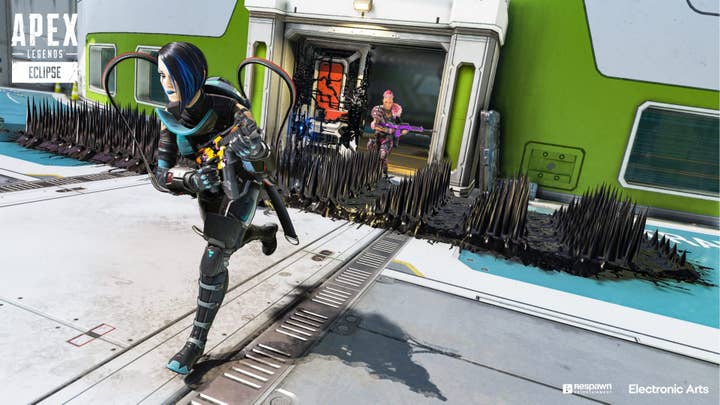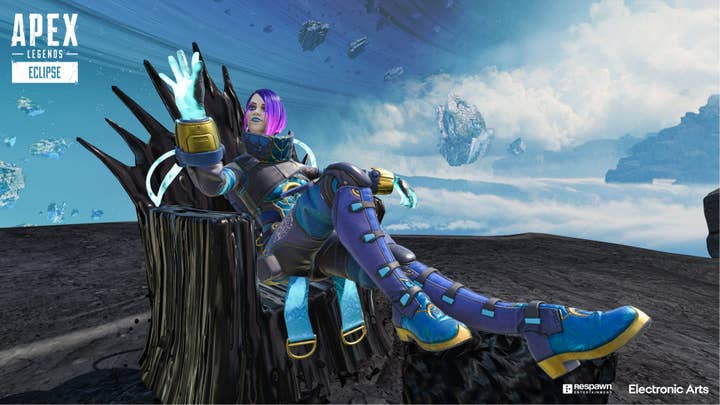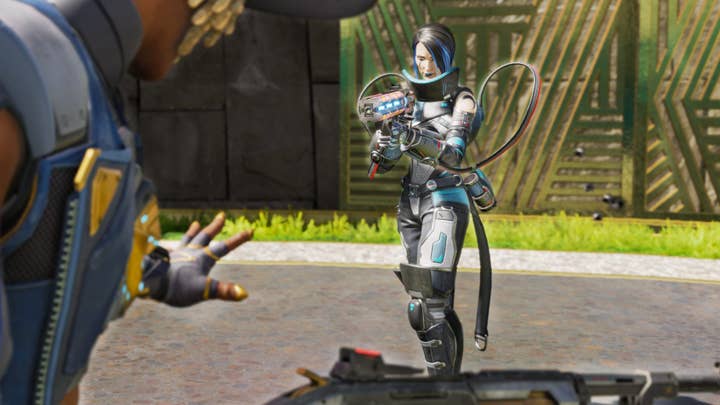The how and why of Apex Legends' first trans character
Lead writer, artist, and voice actor for Catalyst recount how she came to be in Respawn's hero shooter
Last year, Respawn Entertainment introduced the first trans character to Apex Legends, the defensive conjurer Catalyst.
While one might assume the name represented the studio's hope that the character would accelerate changing attitudes towards trans acceptance in games and culture more broadly, Respawn lead writer Ashley Reed tells us the character's name actually sprung more from a brainstorming session around her in-game abilities, which are the result of a chemical reaction she creates in ferrofluid.
"One of our former designers was like, 'Oh, like a Catalyst?' and we were like, 'That's a cool word'," Reed recalls.
Everyone on the team loved it, the legal team quickly signed off on it, and it worked from a gameplay perspective as well, with players able to quickly and easily communicate in-game to say what "a Cat" on the other team is doing and be readily understood.
From our discussion with Reed, Respawn 3D character artist Mirim Lee, and Catalyst voice actor Meli Grant, it's clear the rest of the creation process behind Apex Legends' first trans character was considerably more deliberate.
"Apex has been really dedicated to creating a diverse cast because we think it's very important," Reed says. "This is something that takes place in the future, and it's both the future of our world would reflect the diversity we see in the world today, and what we hope for in the future.
"It can almost be simplified down to 'Because we wanted to.' I think that's essentially the answer, and it's because we had that grounding in wanting to have a diverse cast."

Once the decision was made to add a trans Legend to the game, Respawn wanted to make sure it was done right. Early production on Catalyst was done with trans developers, but as the character came together, Respawn also enlisted the help of GLAAD on a consulting basis for another layer of feedback and set of eyes on the process.
"At that time it was very helpful because GLAAD was double-checking with us if things could be misunderstood by people, or if we were missing something," Lee says, describing it as "a very collaborative process."
"Nobody was standing against anything, and they understood the game production very well too," Lee says, "It was very useful and very helpful. We still didn't really change a big part of anything. They agreed with a lot we'd already done, and it was a very smooth process."
Grant, who is openly trans herself, adds, "I was consulted and my ideas and opinions and feelings about the character, and the experiences they represent were seriously considered and it was very collaborative as we worked on the character."
Other pop culture properties in recent years have added marginalized identities to their games a variety of ways, including by taking an established character and unexpectedly adding that marginalized trait to them.
When asked if there was much discussion about which route to take in adding a trans character to the game, Reed says there wasn't.
"It would feel really bad to design a character with this part of their identity totally not in mind and then just be like 'A-ha!' and stick it on," she says. "Because that's not how people are. People are informed by the circumstances of their birth and things about them that develop over time. That informs them to the core, so you never just have something tacked on one day: 'Oh, I'm this now.' That's not what happens with human beings."
"It's so much more fulfilling, meaningful, impactful, and I feel resonates better with people if it's very clear that's the vision from the start"Meli Grant
Grant says she believes there's a place in storytelling for characters to question, discover, and ultimately come out through the narrative, but says it works best if that sort of arc for a character was planned from the beginning.
She points to the Borderlands character Lor as an example. Lor was introduced in Borderlands 3 and transitioned between that game and New Tales from the Borderlands, but Grant says they cast trans masculine voice actor Ciaran Strange to play the character from the start.
"I think it can ring a little hollow sometimes if you make that decision too late in the game because you might be able to craft a really beautiful story, but you'll be missing all of the authenticity and representation elements, or doing a very intrusive recasting," Grant says.
"It's so much more fulfilling, meaningful, impactful, and I feel resonates better with people if it's very clear that's the vision from the start, and you're involving people from those groups so they can tell that story in an authentic way."
Grant says it's fairly common for companies looking to increase representation in their games and animated shows to add queer characters or characters of color into their stories but leave those same marginalized people out of the creative process.
"You're not only finding an actor who can lend their own experiences and authentic voice to the character," Grant says of casting representatively, "but also to make sure you're creating opportunities for the people whose stories you're trying to tell. And that gets forgotten sometimes."
When it does get forgotten, that can undermine the potential benefit of the representation in question.
"It's one thing to be out there looking for a mirror of yourself in the world so you have an idea of what you can do with your life," Grant says. "To see a character on the page of a fantasy book or a video game is powerful. But it's even more powerful when you can see a real human like you thriving and being successful, to show you a blueprint that it's an actual thing you can do, and there's someone like you doing it. I think that's really powerful."

On the flipside of the same coin, she also sees people who think members of these marginalized groups can only play characters that match up to their own lives 1:1.
"It's almost like people Jedi mind trick themselves into thinking you can only play yourself, and we don't see the same opportunities other folks get," Grant says. "It feels silly from a top-down perspective because at the end of the day, this is voice acting, and anyone can commit the time, energy, focus, drive, and resolve to studying this craft and learning to excel in it and be a competitive, phenomenal performer."
She acknowledges those two complaints could feel like a double-standard – the idea that cis people shouldn't play trans characters but trans people can play cis characters – but adds it's somewhat essential to levelling a historically slanted playing field.
"To see a character on the page of a fantasy book or a video game is powerful. But it's even more powerful when you can see a real human like you thriving and being successful"Meli Grant
"We have to hit creating opportunities from two fronts," she says, "and make sure we're allowing people to tell their own stories so we're not essentially taking jobs from people but profiting off their stories, which doesn't feel right or kind. At the same time, [we're] looking beyond that with folks from marginalized groups and creating opportunities across the board for them."
From a writing standpoint, Reed suggests the most important thing is to have a viewpoint for the character and go with it.
"There's no monolithic way to be trans, so if you try to do everything everybody would possibly want out of a trans character, you're going to have a nothing," she says. "It's going to be box-ticking and not like a person. And that can be difficult, because you'll want to go a direction but someone will say that direction is missing out on this particular subgroup of people and that's a real shame, but it's really important for that character to feel like a character.
"So in your journey to create this character, have a frame of reference for who this character is as a person and keep that as your north star."
As for other tips they would give to developers looking to include trans characters in their game, "don't be afraid" would be one of them.
"It was really fun and dynamic," Lee says. "It was a nice memory and a nice experience. We didn't have any trouble with it. We did a pretty good job I would say, and I'm proud of it. Don't be afraid; it's a great experience and you'll learn a lot too."
Sign up for the GI Daily here to get the biggest news straight to your inbox

